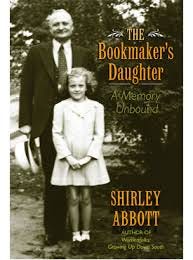The Bookmaker's Daughter
A Personal Evaluation for True Crime Research
Shirley Abbot's memoir The Bookmaker’s Daughter tells the story of her childhood in Hot Springs, Arkansas, in the 1930s and 1940s. It focuses on her father, Hat Abbot, a bookmaker in the city’s illegal gambling scene. The book was first published in 1991 and has since been reprinted in 2006 with a new introduction by the author. The book is a valuable resource for true crime research, as it provides a personal and detailed account of the illegal gambling scene in Hot Springs during this time period.
Historical Context of Hot Springs, Arkansas
Hot Springs is a small city in Arkansas best known for its natural hot springs. The city has a long history of illegal gambling, which began in the early 1800s. By the 1920s, Hot Springs had become a major gambling destination, featuring several casinos and a horse racing track operating within the city. The illegal gambling scene in Hot Springs was controlled by a powerful political machine led by Mayor Leo P. McLaughlin. The McLaughlin machine operated with impunity for many years due to its connections with influential politicians and law enforcement officials.
Notable Characters of the Illegal Gambling Scene
In the 1930s and 1940s, when Abbot was growing up, the illegal gambling scene in Hot Springs was still thriving. Abbot’s father, Hat Abbot, was a bookmaker at the Southern Club, one of the city’s most popular casinos. Hat Abbot was a well-known and respected figure in Hot Springs’s underworld. He was also a close friend of McLaughlin and other powerful figures in the city. As a result, Hat Abbot could operate his bookmaking business without fear of prosecution.
The Bookmaker’s Daughter
The Bookmaker’s Daughter offers unique and valuable insight into the illegal gambling scene in Hot Springs during this era. Abbott’s personal experiences and her close relationship with her father provide her with a distinctive perspective on the people and events that shaped the city’s history. Abbott’s memoir is also remarkable for its vivid descriptions of Hot Springs. Abbott’s writing brings the city to life, and her portrayals of the people and places she knew are both memorable and informative.
My Personal Opinions
I found The Bookmaker’s Daughter to be a valuable resource for my research on the illegal gambling scene in Hot Springs. Abbott’s memoir offers a personal and detailed account of the people and events that shaped the city’s history. I was particularly interested in Abbott’s descriptions of her father and his connections to the McLaughlin machine. I was also fascinated by her insights into the various gambling establishments in Hot Springs.
Offers a fascinating look at Hot Springs, Arkansas’s illegal gambling scene and highlights many of the notable figures who contributed to the rampant political corruption in the area during that time. I consider this one of the book's most valuable aspects. Abbott’s personal experiences and her close bond with her father provide her with a unique viewpoint on the people and events that shaped the city’s history.
I’m not a fan of purple prose. At times, I found Abbott’s writing to be a bit excessive. However, I did appreciate her vivid descriptions of Hot Springs. Abbott’s writing brings the city to life, and her depictions of the people and places she knew are both memorable and informative.
Areas for Improvement
While I consider The Bookmaker’s Daughter a valuable resource, there are a few areas where I believe it could be enhanced.
First, I would like to see more information about the McLaughlin machine. Abbot mentions McLaughlin and other influential figures in the city, but she doesn’t provide many details about how the machine operated.
Second, I would like to learn more about the social and cultural context of the illegal gambling scene in Hot Springs. Abbot shares some information about this, but I believe she could have elaborated further.
Finally, I think the book could use additional editing. There are several typos and grammatical errors in the text.
Overall Value
Despite these minor criticisms, I still recommend The Bookmaker’s Daughter as a valuable resource for true crime research. Abbott’s memoir offers a unique and detailed account of the illegal gambling scene in Hot Springs during the 1930s and 1940s. This book is an important addition to the literature on organized crime in the United States.
The Bookmaker’s Daughter is a well-written and informative text that gives a unique glimpse into the illegal gambling scene in Hot Springs, Arkansas, during the 1930s and 1940s. I would suggest this book to anyone interested in true crime, organized crime, or the history of Hot Springs.


